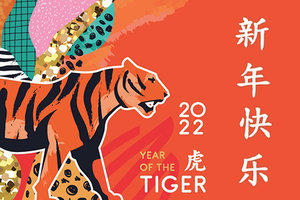Greetings to one and all in the acupuncture / traditional medicine profession as we prepare to begin the Year of the Tiger. This year will bring challenges and changes, and an opportunity to further our medicine like never before. It only requires one commitment on your part: Live 2022 like a tiger. Here's what I mean.
Bravery
To move acupuncture into its rightful position in the U.S. health care system, we must be brave. That starts by getting the Acupuncture for Our Seniors Act (H.R. 4803) passed, so acupuncturists are officially recognized in the Medicare system (and can both treat seniors and be paid by CMS for doing so).
 What does it take to pass a federal bill through Congress? It will take some effort on the part of every acupuncturist. In the media world, it's called soft touches; we need to soft touch everyone in Congress. This means contacting your congressional representative(s). For many in our profession, this may be outside your comfort zone, but think of it instead as an opportunity to be brave.
What does it take to pass a federal bill through Congress? It will take some effort on the part of every acupuncturist. In the media world, it's called soft touches; we need to soft touch everyone in Congress. This means contacting your congressional representative(s). For many in our profession, this may be outside your comfort zone, but think of it instead as an opportunity to be brave.
It's our job to contract our individual members of Congress. This is called a grassroots effort. However, it's not nearly as challenging as you might think.
The ASA / NCCAOM and the federal lobbyists retained to help pass the Medicare bill have made it easy using an app called Phone2Action. Here's all you have to do to make a difference:
- Open a new text message on your cellphone.
- Text the word ACUPUNCTURE to 52886. (Text the word STUDENT to the same number if you are a student.)
- Send the text and a link will appear; open it.
- Fill in your name and address (including zip code, which will identify your congressional representative).
- Click send and a message written by one of our federal lobbyists will display.
- Click send to deliver the message to your congressional representative.
It's a simple process, but an important one, because every message equals a touch. We need as many touches as possible to make an impact.
The short message was written by one of our federal lobbyists. The message will change periodically, so you can actually touch your congressional representative more than once. That's critical because it often requires a number of soft touches to get someone to 1) listen and then 2) take action.
Authoritativeness
We must be authoritative in understanding and using the ICD-11 Traditional Medicine codes, something I talked about in my first 2021 column; and also appreciate that doing so will increase our authority in health care.
The World Health Organization released the ICD-11-TM codes on Jan. 1, 2022. Many have worked hard to bring this coding project to the release phase. The WHO started the process in 2003 by standardizing point location and terminology.
The codes provide for the diagnosis of more conditions other than just pain. The more we can document additional conditions, the more data we collect on our medicine's value; and the more credibility we can establish for traditional medicine.
Being able to double code is also important: using an ICD-10 "Western" code, interfaced with an ICD-11-TM "Eastern" code and then adding the differentiation of patterns. Other professions may know point location and how to needle, but your knowledge of TM disorders and patterns is your strength.
It's critical that we embrace the new diagnostic codes. Why? Because once we embrace these codes and integrate them into our practices, we will be able to demonstrate the efficacy we have only been able to share with the public by clinical experience. Every patient encounter will be a data set to be shared with the health care world, proving the value of our medicine far beyond our own walls.
Confidence
It takes great confidence to collaborate with others, rather than stand alone. I'm talking about collaborating with your fellow practitioners and other health care professions. It starts by admitting what for some can be a painful truth: "Your way" – your technique, your philosophy, your method of practicing – is not necessarily the "right" way in every situation and with every patient. Working together – both within our profession and with other health care disciplines – is the key to moving our profession forward and maximizing our credibility.
This confidence must be exhibited by every practitioner, every AOM school, and every association and professional organization. The infighting must stop. We are far more powerful as a whole than we are as fragmented parts. It's time to step up. It's time to be a tiger.
Click here for more information about Marilyn Allen, Editor-at-Large.




